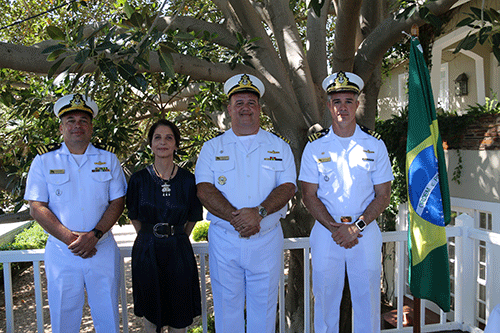Brazil would like to tap into avenues such as security to safeguard the interests of the two nations so that Namibia can fully realise her potential and make a mark in the blue economy.
Brazil’s ambassador to Namibia, Vivian Loss Sanmartin, said yesterday that the two countries’ strong naval cooperation, spanning 30 years,
is a true testament to the enduring trade relations that exist. The South American country is thus committed to working with Namibia to strengthen those ties.
Sanmartin noted that Brazil has heavily invested in its coastal area, considering that 80% of her country’s population is based in coastal areas, while Namibia only has a
small portion of the population in the coastal areas.
“There are many things we can still do together. One of the things we are discussing is helping Namibia with security issues that will come with the new oil and gas sector because this is something new for Namibia, and the reserves of the country are mainly offshore,” she said as the countries marked a third decade of naval cooperation yesterday.
She stated that the cooperation between the two countries is unique, and there is a need to continue strengthening that.
“As Namibia wants to promote all these areas for southern Africa, it is important to address the issues around security. Namibia needs a strong navy, and we can work together on that,” stated Sanmartin. Yesterday marked the 30th anniversary of the Brazil-Namibia Agreement for Naval Cooperation, which paved the way for Brazil’s biggest and strongest naval cooperation in Africa. “How one can address illegal fishing, piracy and all, is that one has to develop a system of alert because the ocean has no boundaries; there are no walls or fences that can be crossed”, she observed. The ambassador said although Namibia has not experienced major issues like piracy like other African countries, these issues could come about in the region due to more economic development in the blue economy.
“Namibia already has a service to protect the blue economy, and that economy is becoming very important for the country and Brazil.
But people don’t realise that they are usually faraway from the ocean and don’t realise its significance, so we must protect our coast and continental shelves,” she continued.
Commander Alexander de Oliveira said he is impressed with how Namibia has developed its navy. “For us (Brazil), it is important to be part of this growth of the Namibia Marine Corps’ history. We are helping with the graduation of 73 marine recruits from the Naval Training School; and we have assisted with several operations, including harbour security – they are capable and versatile. This is the branch of the navy that can help with the protection of Namibia’s resources even more,” expressed De Oliveira.
Fellow commander Fonseca Azeredo said Namibia and Brazil will continue working together because there are a lot of avenues which need to be explored for transportation.
“It is not easy crossing the Atlantic Ocean for 14 days’ goods; there is a lot that goes into that operation. Most of the things that we have come through the sea, so we have to fully understand the importance of this cooperation,” said Azeredo. Another commander, Rogerio Machado, indicated that the cooperation has improved over the years, and they are excited to be part of that history.


